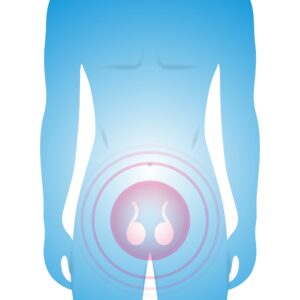Anorchia Treatment in Los Angeles & San Francisco
What is Anorchia?

Anorchia is a rare condition in which a man is born without testes but with a normal penis and scrotum. Known as congenital anorchia, this has also been referred to as “vanishing testes syndrome.” It is sometimes confused with bilateral undescended testes, a condition in which the testes fail to move into the scrotum before birth and remain in the abdomen or groin.
 Acquired anorchia occurs when the testicles are surgically removed due to cancer, trauma or infection. Testicular torsion, in which the spermatic cord that provides blood flow to the testicle twists and cuts off blood supply, is another problem that may require orchiectomy (the surgical removal of one or both testicles).
Acquired anorchia occurs when the testicles are surgically removed due to cancer, trauma or infection. Testicular torsion, in which the spermatic cord that provides blood flow to the testicle twists and cuts off blood supply, is another problem that may require orchiectomy (the surgical removal of one or both testicles).
Dr. Paul Turek’s research has shown that congenital or acquired anorchia can have profound effects on the self-esteem and sex lives of men who are affected by it. Often, the personal decision to have a testicular implant placed to achieve the look, feel and weight of a normal-looking scrotum can vastly improve the quality of life in these cases. Dr. Turek led the charge in the United States to provide FDA-approved testis implants for testicular loss, by both designing the implant and overseeing and publishing the multicenter clinical trial that showed its effectiveness.
Detecting and Diagnosing Anorchia
In addition to a visibly empty scrotum, other signs of anorchia include lack of male sex characteristics at puberty. For example, penis and pubic hair growth may be hindered, the voice may not deepen and muscle mass may not increase during puberty.
Several tests may be performed to confirm anorchia. Testosterone levels, luteinizing hormone (LH) and follicle stimulating hormone (FSH) blood tests along with bone density may be measured to assist in the diagnosis.
How Is Anorchia Treated?

Males with congenital anorchia may fail to start puberty at the correct time. Testosterone supplementation can be used to initiate puberty and normal sexual development.
The placement of testicular implants can recreate the look and feel of natural testicles for improved body image, confidence and quality of life. Although the prostheses do not function like natural testicles, meaning they don’t produce sperm or testosterone, they can help men achieve a “normal” look and feel and reduce the stress of having an empty scrotum.
Dr. Turek championed the development of the first and only FDA-approved testicular implant. After studying the devices in hundreds of men and male children, he showed they were safe and effective. Thanks to Dr. Turek’s expertise, thousands of men have regained a natural appearance and improved self-confidence with testicle implants.
If you or your child is facing anorchia, psychological support is also very important. Being diagnosed with anorchia can be overwhelming and upsetting, and it may bring up questions relating to gender. Compassionate medical professionals and peer support can be crucial in helping you or your child handle the diagnosis.
Anorchia FAQs
Can someone with anorchia have a normal sex life?
Yes, with appropriate medical treatment, individuals with anorchia can have a normal sex life. Anorchia, or the absence of both testicles, results in low testosterone levels, which can affect libido, erectile function, muscle mass, and overall energy levels. However, testosterone replacement therapy (TRT) effectively restores hormone balance, allowing individuals to maintain a healthy sex drive and normal sexual function.
Testosterone therapy typically begins in adolescence to support normal puberty and continues throughout adulthood to maintain masculine characteristics, muscle mass, bone and sexual health. With proper hormone management, most individuals with anorchia have no limitations in their sexual health and relationships.
Can a man with anorchia become a biological father?
No, a man with anorchia cannot become a biological father because sperm production occurs in the testicles, and without testicular tissue, there is no source for sperm. Unlike cases of non-obstructive azoospermia, where sperm may still be present in small amounts within the testes, individuals with congenital anorchia do not have sperm-producing cells at all.
For those who wish to have children, alternative family-building options such as sperm donation, or adoption (of children and now embryos) are routinely considered.. Stem cell-based therapies that attempt to create sperm from skin or other tissues is an active area researched by Dr. Turek and others, but it is not currently clinically available. Consultation with a reproductive specialist can help individuals explore the best options for their situation.
Can anorchia be detected before birth?
Yes, anorchia can sometimes be suspected before birth through prenatal imaging and hormone testing, but a definitive diagnosis is usually made after birth. During pregnancy, if a fetal ultrasound detects an absence of testicles in the scrotum and inguinal canals, doctors may suspect a condition affecting testicular development.
Additionally, prenatal hormone testing — such as measuring levels of anti-Müllerian hormone (AMH), inhibin B, and testosterone — can indicate whether functional testicular tissue was ever present. However, most cases of anorchia are diagnosed in infancy or childhood when a baby is born with an empty scrotum and fails to develop normal male secondary sexual characteristics.
How is anorchia different from testicular regression syndrome?
Anorchia and testicular regression syndrome (TRS) are similar in that both involve the absence of testicles, but they differ in their underlying causes and timing of testicular loss.
- Anorchia is a congenital condition where testicles never develop or completely disappear due to an early intrauterine event, usually occurring 8 weeks before gestation.
- Testicular Regression Syndrome (TRS) occurs when testicles begin developing normally but are lost at a later stage, typically after the first trimester or even later in fetal development. Some individuals with TRS may have remnants of testicular tissue or scarring.
Both conditions lead to similar clinical outcomes — absence of testicular function and infertility — but their causes and diagnostic evaluations differ.
Contact The Turek Clinic
If you or your son was born without testicles or is missing a testicle for other reasons and you would like to discuss your implant options with the Father of the Testis Prosthesis, please request an appointment at The Turek Clinic. Dr. Turek will answer all of your questions and help you make the best decision for your needs or your child’s needs.









